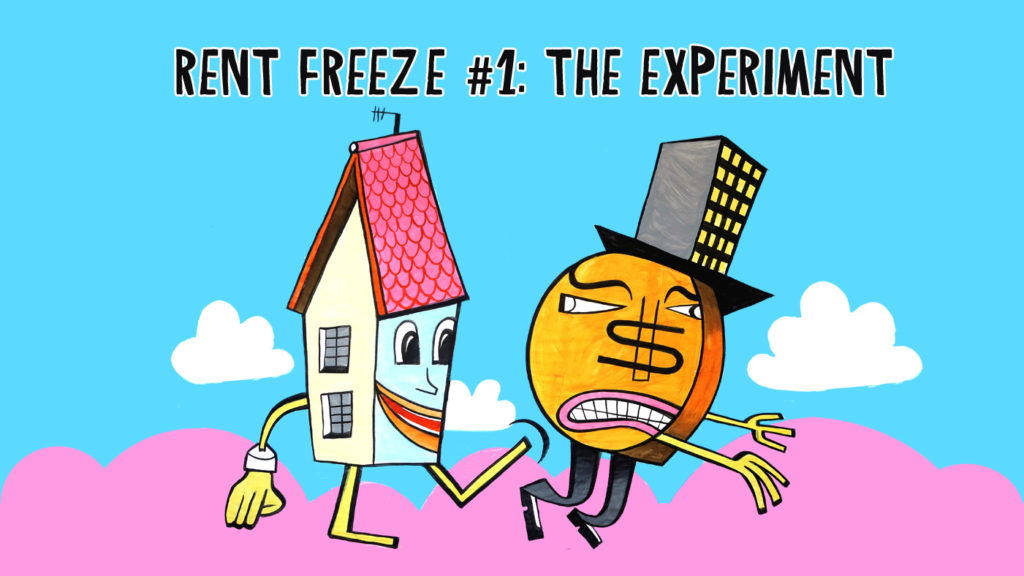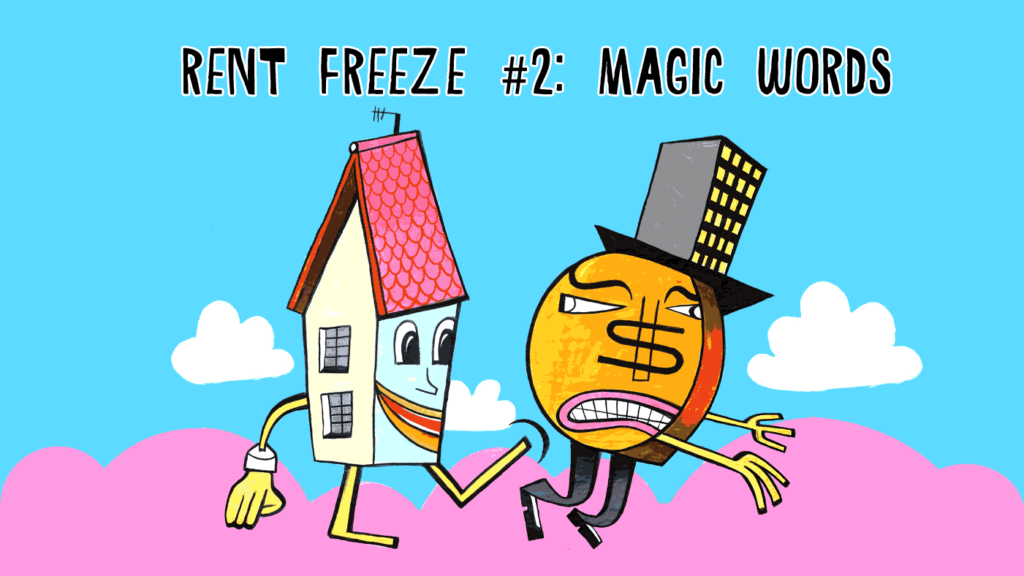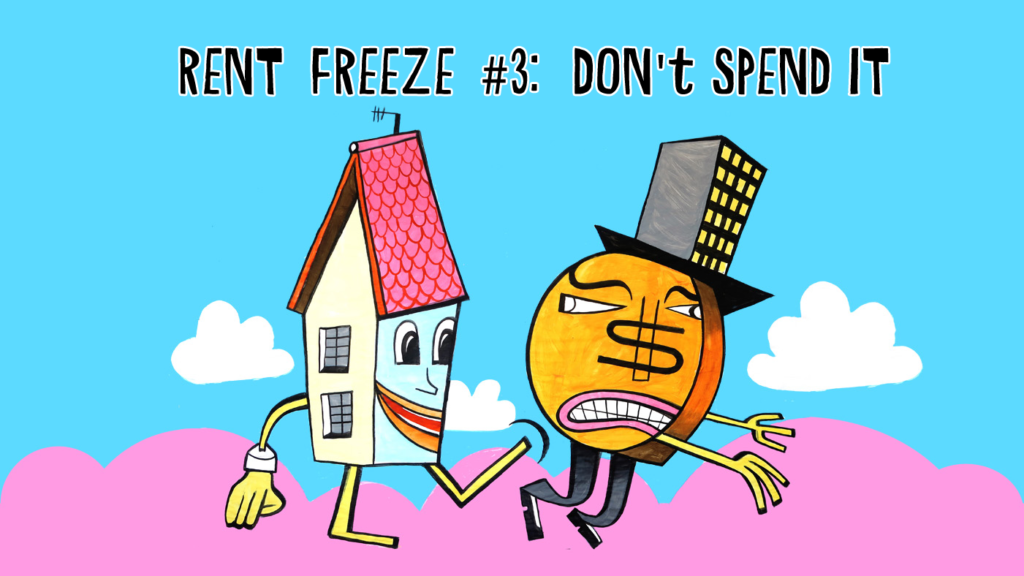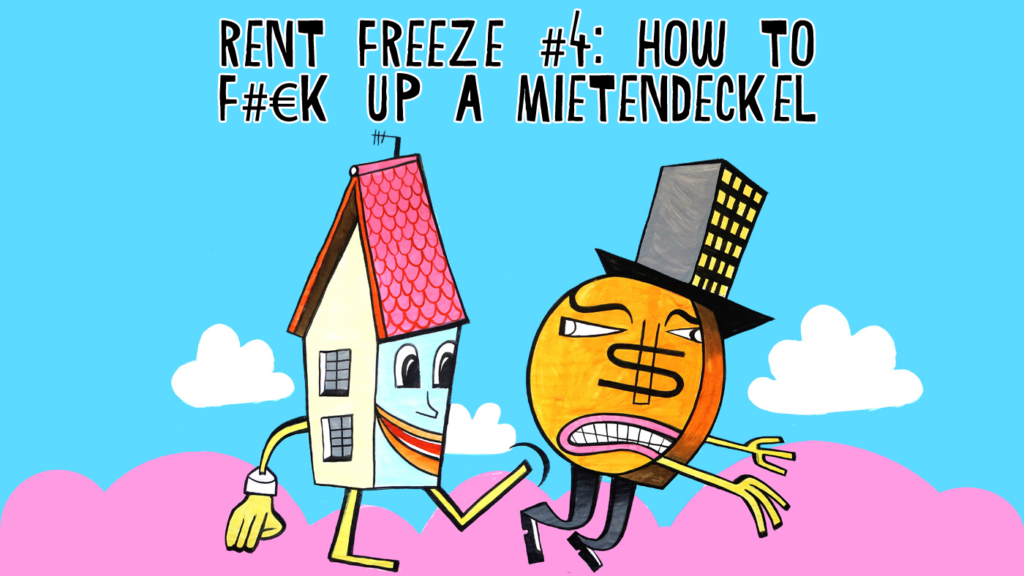Rent Freeze – A Podcast About Berlin’s Rental Revolution

This is an experiment. What happens when an entire city of 3.5 million residents stops paying rent increases for the next five years? Rent Freeze is a podcast about Berlin’s rental revolution. A radical new housing law is attempting to stop runaway rental prices by freezing them for half a decade. On this series, we’ll explain what the rent freeze is all about, speak to supporters and critics, and follow the consequences – intended and unexpected. No one knows what will happen next. After all, this is an experiment.
Rent Freeze is produced and presented by Joel Dullroy, Maisie Hitchcock, Jöran Mandik and Daniel Stern. Music by Tom Evans. Sound recording by Stefan Lindner. Artwork by Jim Avignon.

Rent Freeze #1: The Experiment
What happens when an entire city of 3.5 million residents stops paying rent increases for the next five years? Welcome to Rent Freeze, a podcast about Berlin’s rental revolution.
Berlin is about to introduce the Mietendeckel, a law that will freeze rents for five years, cap new rental contracts at a maximum price, and allow some tenants to claim a rent reduction. Supporters say it will be the best thing to happen to the city since the fall of the Wall
But investors and landlords are outraged. They say the reforms will scare off businesses, leave houses unbuilt and in disrepair, and feed a grey market for off-the-books rental as desperate Berliners try to find a flat.
On this episode we explain the basics of the law, and talk to Daniel Halmer of Wenigermiete.de about why the existing rent controls haven’t worked.

Rent Freeze #2: Magic Words
Berlin’s rent freeze has begun, but nobody seems to know what’s going on. Landlords and tenants alike are confused about what to do next. Rents are now capped at the rate paid in June 2019 – all increases since then are invalid. New contracts can’t exceed about €9.80 a square meter – half as much as many advertised prices. And landlords face fines of half a million euros for cheating.
On this episode we go inside Berlin’s parliament to hear the moment the rent freeze law was passed. Supporters and opponents gave fiery speeches in a rowdy session, which ended with politicians voting to suspend the free market for rental property for five years.
We hear what landlords think about the new law. Some are devising ways to cheat – by renting to ignorant foreigners: “Those who screw their landlords are old Germans.” Despite the threat of huge fines, some don’t think the city has the resources to prosecute them.
And what should tenants do if they hope for a rent decrease? Lawyer Daniel Halmer from Wenigermieter.de says they should start adding three magic words to their rent transfers: “Zahlung unter Vorbehalt.” It means paid with reservations, and gives tenants the right to to try to claim back overpayments at a later date.

Rent Freeze #3: Don’t Spend It
This month residents of Berlin should experience the biggest collective rent reduction in history. About 340,000 residents – one in six – may be eligible for a rent cut under the Mietendeckel, Berlin’s radical new housing policy. But landlords are doing their best to stop it.
On November 23 landlords must reduce rents to regulation levels or face fines of €500,000. Tenants can check if they’re paying too much at this website: http://www.mietendeckel.berlin.de
And they can report cheating landlords to the city government here.
Anyone who gets a rent reduction should save the money, as they might have to pay it back. The Mietendeckel is being challenged in Germany’s constitutional court, with a ruling expected in mid-2021. Jöran Mandik explains the court process – and the judges’ red robes.
Furnished flats are not exempt from the Mietendeckel. But some companies are offering a buy-and-lease-back service model to help landlords get around the law. Tenants are told they have no choice but to rent both the flat and the furniture together. Other tricks include renting expensive basements, parking spaces and coworking desks inside their flat.
Double contracts have become standard: residents are offered two prices – a lower one that matches the rent freeze legislation, and a higher one they’ll have ot pay if the law is later ruled unconstitutional. Such double contracts are most likely legal and enforceable, says rental expert Daniel Halmer from Conny.legal (formerly Wenigermiete). But they could still be challenged using the Mietpreisbremse law, an older regulation which limits rent prices under some conditions.
What’s the effect of the rent freeze so far? If you already have an apartment, the rent freeze appears to be working as expected. If you’re looking for an apartment, things are tougher due to landlords restricting supply. A study by the ZIA found average rental prices have sunk by 5.7% in the first half of 2020. But availability has also fallen by about 50%, as property owners withhold empty flats from the market. For new flats built after 2014 – which are exempt from the Mietendeckel – prices are up 7.5%, and availability has increased by 18%, according to real estate portal ImmobilienScout24.
Swedish property management company Heimstaden Bostat isn’t deterred by the rent freeze. The company is trying to purchase about 130 buildings with almost 4000 apartments at a cost of €830 million. Heimstaden told us they had factored the rental regulations into their financial planning.
Researcher Christoph Trautwetter recently produced a report called ‘Who Owns Berlin’ for the Rosa Luxemburg Stiftung. He debunks the myth that warned the Mietendeckel would scare investors away. “There is an excess of capital looking to invest under any condition, and ready to accept the Mietendeckel as a condition to invest in Berlin,” Trautwetter said. You can read his report here: https://www.rosalux.de/publikation/id/43284

Rent Freeze #4: How To Fuck Up A Mietendeckel
The Berlin Mietendeckel experiment is finished. The city’s revolutionary attempt to freeze rental prices for five years, and reduce overpriced leases, has been killed off by Germany’s highest court.
The decision has unleashed a political storm. Everyone is angry – but who will voters punish? The R2G parties who tried to regulate rents? Or their opponents, the CDU and FDP who successfully derailed the project? We make the case for why each side is to blame.
There’s a big bill to pay, as hundreds of thousands of Berliners now face back-payments, higher rents and permanent shadow contracts. We’ll run the numbers on the potential local economic crisis that could follow.
What hope is there left for affordable housing? And what can the rest of the world learn from Berlin’s short-lived rental revolution? The experiment is over. Now it’s time to analyze the results
The Challengers
The CDU and FDP took the Mietendeckel law to the constitutional court, where it was struck down. They perpetuated a false narrative – “build, don’t cap” – which claimed, incorrectly, that the Mietendeckel prevented new development (constructions from 2014 were specifically excluded from the law). The CDU was responsible for weakening federal rental regulations in the first place, enabling prices to skyrocket.
And then there’s political donations – or as Joel calls it, legalized corruption. Almost 80% of the CDU’s publicly-declared donations come from the real estate sector.
Joel interviews Berlin FDP leader Sebastian Czaja and challenges him on his false claim that the Mietendeckel prevented building, and on the FDP’s donations from real estate companies. Czaja says his party takes donations from all parts of society.
The Supporters
Are the parties who created the Mietendeckel culpable of incompetence? The governing coalition of the SPD, Die Linke and Die Grünen – or R2G – took a huge political and financial gamble, and lost.
The R2G promised renters a revolution, but delivered a regression. Many tenants must now make large back payments for which they have not saved. They went against the advice of many legal experts who warned their law was unconstitutional.
We speak to two of the Mietendeckel’s creators. Kilian Wegner is a law professor and SPD member who co-authored a policy paper which laid the groundwork for the Mietendeckel. He says the R2G was right in taking a chance on an uncertain law, due to out-of-control property prices.
Another lawyer, Professor Franz Mayer, wrote an expert opinion which argued Berlin had the constitutional right to create the Mietendeckel. He says there was a chance of success, and believes the court should have helped tenants by negating backpayments.
The Big Bill
How much will the Mietendeckel fiasco cost? We interview real estate researcher Christoph Trautvetter. He estimates the backpayments will cost renters between €100 to €300 million. Ongoing rent increases will cost around €500 million annually – that’s half a billion euros flowing from tenants to landlords, money not going into the local economy.
Daniel Halmer from Conny.Legal, formerly Wenigermieter, says tenants may be able to reduce backpayments and shaddow rents by using the Mietpreisebremse – the existing rental regulation that limits rent increases to 10% of local prices.
Time to Sieze Property?
An even more radical concept is now gaining support – the referendum initiative known as Deutsche Wohnen & Co Enteignen, who want to seize properties from big corporate landlords.
We speak to Wouter Bernhardt from the movement’s podcast Von Menschen und Mieten. He says expropriation would be a permanent solution to rising rental prices.
The End of the Experiment?
The Mietendeckel experiment ran too short to answer many questions, and the data was disrupted by the parallel pandemic. But we did learn a few things. If you want a minor reform, demand a revolution. If you get your revolution, prepare for reprisal. Tenants globally now know rent control is no longer excluded from the political discourse.
Rent Freeze is produced and presented by Joel Dullroy, Maisie Hitchcock, Jöran Mandik and Daniel Stern. Artwork by Jim Avignon. Music by Tom Evans and Ducks!
Buy a t-shirt, bag or coffee mug!
On our series we speak about Berlin’s housing market. But of course there are those Berliners who are completely excluded from it and don’t have a home at all. Winter is fast approaching and they need help. Please consider donating to the following organisations to help them take care of our homeless:
Berliner Obdachlosenhilfe: https://www.berliner-obdachlosenhilfe.de/
Caritas: https://www.caritas-berlin.de/
Berliner Stadtmission: https://www.berliner-stadtmission.de/
Kältehilfe Berlin: https://www.kaeltehilfe-berlin.de/
Obdachlosenhilfe Die Brücke: http://www.obdachlosenhilfe-die-bruecke.de/